Principality of Petralta
Principality of Petralta | |
|---|---|
Flag
| |
| Motto: "Iustitia, æqualitas, libertas" (English: "Justice, equality, liberty") | |
| Anthem: Jewel of the River | |
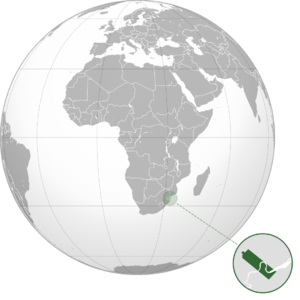 Location of Petraltine territory. | |
| Capital | District of União |
| Largest city | District of Copas |
| Official languages | Portuguese, Esperanto |
| Demonym(s) | Petraltine |
| Government | Unitary semi constitutional monarchy |
• Prince Regent | Dominique Bastos |
• Prime Minister | TBD |
| Legislature | The Royal Council of Petralta |
| Establishment | August 16th 2021 |
| Population | |
• (as of 2021) census | 21 |
| Currency | Petraltine Ducat |
| Time zone | CAT |
The Principality of Petralta, commonly referred to as Petralta, is a land-locked micronation in Southeast Africa. Petralta is bordered on all sides by the Republic of Mozambique, with the closest nation to Petralta besides Mozambique being the Kingdom of Eswatini and the Republic of South Africa.
The Principality of Petralta is home to 21 citizens, all of which are former mozambicans. The territory is consists of a strip of land 435 meters long and 95 meters wide that crosses over the Quenhenguapine River towards the southeast. The District of Union is located in the northwestern portion of the territory and is the capital of the nation.
The Principality of Petralta, falling whithin the classification of micronation and unrecognized state, fails to achieve any recognition from the Mozambican government, or the United Nations Security Council, thus it's classification as a micronation. The Principality of Petralta uses the Montevideo Convention of 1933 as it's justification for statehood as a sovereign state, meeting all requirements to be considered a nation, despite that fact, the Principality remains unrecognized by the United Nations.
Etymology
The origins of the name "petralta" come from the Greek word "pétra", meaning rock, and the Portuguese word "alta", meaning high. Petralta means precious land or land of value. Reference to it's natural beauties and the will to preserve it
History
Pre-Establishment (100 CE - 16 August 2021)
Around 100 CE Bantu peoples arrived in the lands of Mozambique. They organized themselves into small kingdoms. In the 9th century, Arab mechants arived in the coast of Mozambique, establishing a trade route between the Arabs and Africans for the centuries to come.
In 1498 the Portuguese sailor Vasco Da Gama landed at the Island of Mozambique on his way to India. The Portuguese established trading posts in the coast of Mozambique and divided the land into large estates called prazos. For centuries the Portuguese had limited control over Mozambique until the 19th century when the Europeans divided Africa.
In the 20th century, Africa was changed and many nations became independent. In 1962 the Mozambique Liberation Front (Frelimo) was founded. Nonetheless, the Portuguese were committed to keep their colonies. In 1964 Frelimo began an armed struggle. The war lasted 10 years. Finally, on 25 June 1975 Mozambique became an independent nation.
The new government in Mozambique adopted Socialist policies leaving Mozambique in filth. In 1977 Mozambique was riven by civil war. An anti-communist organization called Renamo fought the government for 15 years and by 1989 Frelino had given up it's socialist policies with a new constitution. A peace agreement was made in 1992 leading to the present days with the foundation of the Principality of Petralta.
Establishment of the Principality( 16 August 2021 - Present )
In 16 August 2021 was born the Principality of Petralta. The nation brings a national identity to the Quenhenguapine river and the local nature and defends it's citizens' freedom of speech and expression. The country was established by Dominique Bastos, current monarch regent of the nation and had it's first constitution written in January 5, 2022. Since then it longs for it's international recogniston and prosperity as a sovereign state.

Politics and government
The Principality of Petralta is governed under a semi-constitutional monarchy. Political power is shared by the monarch and a Royal Council chosen by the monarch. The prime minister is the head of government and responsible of the Royal Council, however the monarch regent holds considerable political power. The executive power is exercised by the monarch regent and the legislative is vested in by the Royal Council. There is a two-party system in the Royal Council, every four years the prime minister is elected. Declared the death of the monarch regent, resign or incapacity to exercise their functions, the Royal Council runs elections to decide the successor to the throne.

Law and order
The source of the law is the Royal Council of Petralta, which is enacted by the monarch regent. Every law requires the sanction of the monarch regent to acquire validity, otherwise the law is rendered void.
The monarch regent takes, through the Government and independently of the Royal Council, the steps necessary for the execution and compliance with the laws, as well as the steps necessary for the exercise of the powers of administration and supervision, and will take the necessary measures for the safety and well-being of State.
The Petraltine legislation falls under the Mozambican legislation as the nation is not recognized as a sovereign state. The citizens of Petralta have their freedom of speech and expression guaranteed on the constitution and will have those respected even if the Mozambican laws say otherwise. LGBTQIA+ citizens have their gender and right to marry respected even if the Mozambican laws say otherwise.
Military
The Principality of Petralta does not have a Military due to it's small nature, relying on the Mozambican Army.
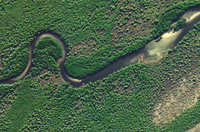
Geography and climate
The territory of the nation consists of a 40.000m² strip of land crossing the Quenhenguapine river. Most of the territory is flat with the riverbed being the only depression. 79% of the country's area is part of a mangrove vegetation, the resting 21% being urbanized. The local savanna climate prevails. In Petralta there is little rainfall throughout the year. The climate classification is tropical savannah according to Köppen and Geiger. Petralta has an average temperature of 22.9 °C or 73,22 °F. The average annual rainfall is 713 mm.
| Climate data for District of União, Petralta | |||||||||||||
|---|---|---|---|---|---|---|---|---|---|---|---|---|---|
| Month | Jan | Feb | Mar | Apr | May | Jun | Jul | Aug | Sep | Oct | Nov | Dec | Year |
| Average high °C (°F) | 29.9 (85.8) |
29.6 (85.3) |
29.3 (84.7) |
27.8 (82) |
26.4 (79.5) |
24.6 (76.3) |
24.4 (75.9) |
25.3 (77.5) |
26.1 (79) |
26.5 (79.7) |
27.4 (81.3) |
29.1 (84.4) |
27.2 (81) |
| Daily mean °C (°F) | 26.3 (79.3) |
26.2 (79.2) |
25.6 (78.1) |
23.5 (74.3) |
21.4 (70.5) |
18.9 (66) |
18.8 (65.8) |
20.0 (68) |
21.5 (70.7) |
22.4 (72.3) |
23.8 (74.8) |
25.5 (77.9) |
22.8 (73) |
| Average low °C (°F) | 22.3 (72.1) |
22.3 (72.1) |
21.5 (70.7) |
19.4 (66.9) |
16.9 (62.4) |
14.4 (57.9) |
14.2 (57.6) |
15.4 (59.7) |
17.2 (63) |
18.3 (64.9) |
19.7 (67.5) |
21.4 (70.5) |
18.6 (65.5) |
| Average Precipitation mm (inches) | 171.1 (6.736) |
130.5 (5.138) |
105.6 (4.157) |
56.5 (2.224) |
31.9 (1.256) |
17.6 (0.693) |
19.6 (0.772) |
15.0 (0.591) |
44.4 (1.748) |
54.7 (2.154) |
81.7 (3.217) |
85.0 (3.346) |
813.6 (32.031) |
| Average relative humidity (%) | 76 | 76 | 77 | 76 | 74 | 73 | 72 | 71 | 73 | 75 | 75 | 74 | 74.3 |
| Average precipitation days (≥ 1.0 mm) | 8.1 | 7.6 | 7.0 | 4.4 | 2.8 | 2.4 | 1.8 | 2.2 | 3.2 | 5.5 | 7.9 | 7.5 | 60.4 |
| Sunshine hours | 223 | 210 | 225 | 229 | 253 | 246 | 256 | 252 | 228 | 210 | 198 | 220 | 2,750 |
| Source no. 1: Deutscher Wetterdienst[1] | |||||||||||||
| Source no. 2: Danish Meteorological Institute (sun only)[2] | |||||||||||||
Economy
The Petraltine economy is very limited. The Principality has issued it's own running currency, the Petraltine Ducat and is based on the cultivation of frutiferous trees. The main products of the country are acerola, jambo and mango. The industry is regulated by the state, private initiative being legal across the nation with the payment of the taxes foreseen in the Petraltine Constitution of January.
Culture and media
Petralta has a culture of diversity and equality, no religion or culture has an official status in the country. The Petraltine people come from Southeast African and Portuguese backgrounds, many celebrate the seasons of the year and the worship of earth. The people has a strong connection with the nature and the Quenhenguapine river.
The most commonly spoken language is the Portuguese language, being widely spoken in the country and used as main form of comunication. Esperanto is used as a lingua franca in official documents and speeches. The Constitution of January was written in the Portuguese language.
Petraltine food consists of mainly Portuguese and Southeast African dishes with influences from the western cuisine. Many of the nation's most consumed dishes include rice and beans as a base. Fish, peppers, sorghum and liponda are common elements found in Petraltine cuisine.
Petraltine music is composed of a fusion of classical, popular and african music. The style celebrates the identity of the people and it's diversity, being usually played with local instruments and rhythms. Many works of art were made to show the pride of the nation. The local art follows western standards depicting regional costumes and the native nature.
National Symbols
| Symbol | Name | Image |
|---|---|---|
| Flag | Flag of the Principality of Petralta | 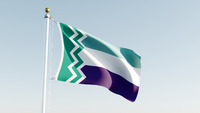
|
| Coat of Arms | Coat of arms of the Princely House of Petralta | 
|
| National colors | Eucalyptus Green American Purple |

|
| National tree | Rosy trumpet tree | 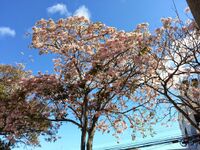
|
| National flower | Scarabough lily | 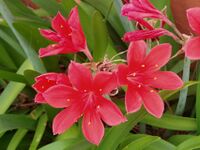
|
| National bird, national animal | Burrowing-Owl | 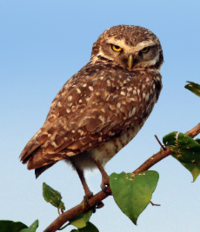
|
| National mamal | Pangolin | 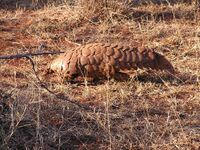
|
National holidays
| Date | Name of the event | Description |
|---|---|---|
| 1 January | New Year's Day | First day of the year according to the Gregorian calendar. Celebrations with fireworks are held in the nation. The day is reserved to celebrate the gift of peace. |
| 25 January | Constitution Day | The day the constitution of the current reign of Petralta was made. |
| 16 August | Petralta Independence Day | The Independence day of Petralta, the day the nation was established as sovereign state and the identity of the people was born. |
| 28 June | Pride day | A day to celebrate the pride of LGBTQIA+ people and their fight for equal rights. |
| 21-25 December | Summer Solstice | The first days of summer in the lands of Petralta and the longest day of the year. |
| 31 December | New Year's Eve | Celebration of the ending of an year and the beginning of another. |
Important months
- Month of June: Pride Month
- Month of August: Petralta Month
- Month of January: Summer Solstice Month
References
- ↑ "Klimatafel von Maputo-Mavalane (Flugh.) / Mosambik" (PDF). Federal Ministry of Transport and Digital Infrastructure. Archived from the original (PDF) on 14 October 2019. Retrieved 4 November 2016. Unknown parameter
|url-status=ignored (help) - ↑
"STATIONSNUMMER 67341" (PDF). Ministry of Energy, Utilities and Climate. Archived from the original (PDF) on 16 January 2013. Retrieved 4 November 2016. Unknown parameter
|url-status=ignored (help)

